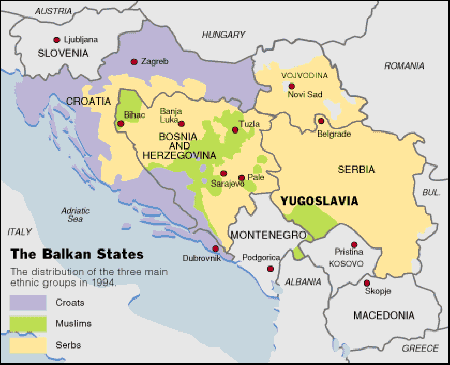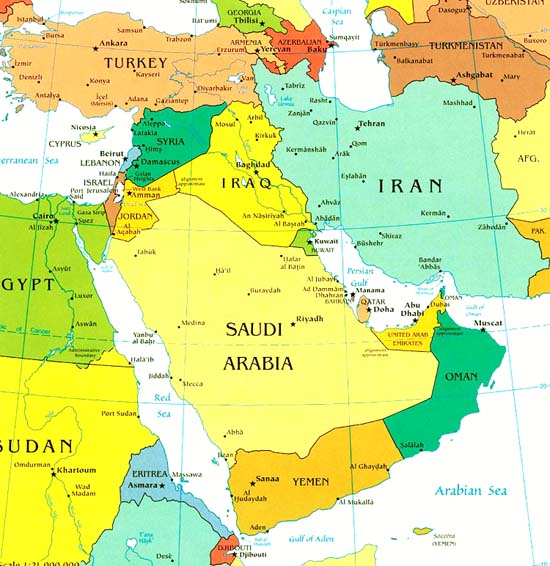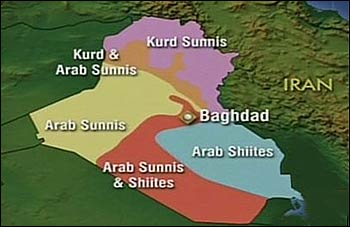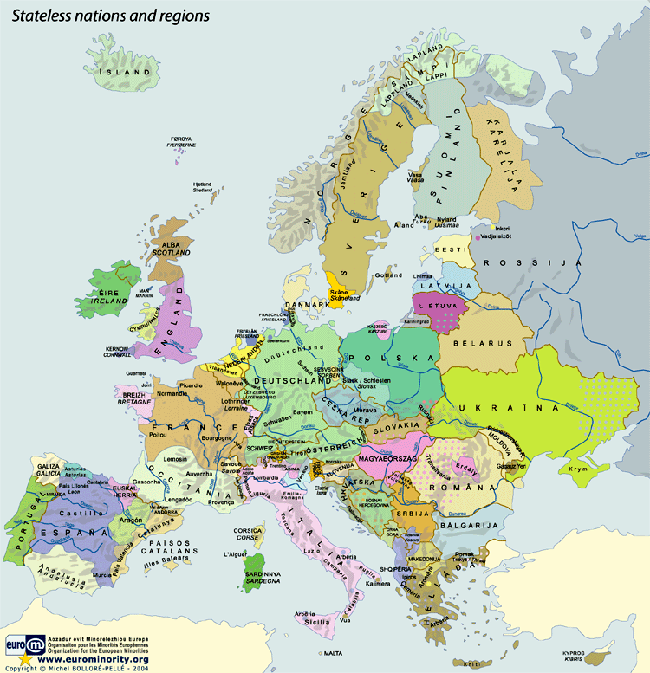|
FOURTH WORLD -
NATIONS WITHOUT STATEs
Nadesan Satyendra
May 2000, March 2007
"Increasingly, the Fourth World is emerging
as a new force in international politics because in the common defense of
their nations, many indigenous peoples do not accept being mere subjects of
international law and state sovereignty and trusteeship bureaucracies.
Instead, they are organizing and exerting their own participation and
policies as
sovereign peoples and nations." -
Bernard Q.
Nietschmann
"The Third World has declared a geographic
war on the Fourth World. This global conflict is assisted by First and
Second World states" Nietschmann quoted in
National Liberation Movements in Global Perspective - Dr. Jeff Sluka
"If you want to be politically marginalised
in a western society, then suggest establishing a new state with a new
political system. And preferably, suggest it should be on an artificial
island, and write the constitution yourself. On the other hand, if
you suggest
establishing a new nation state, for an
existing but
oppressed ethnic group, you will not be treated as a crank. You might be
called a traitor, or even executed for treason. But if you survive that
phase, you might end your life as president of the new state - with
airports, streets, and mountains named after you. And they might even let
you write the Constitution..."
Paul Treanor on the Ethics of secession
If the 1950s and the 1960s were the decades of the anti colonial
liberation movements directed against rule by First World countries (albeit,
weakened by the Second World War), the 1980s and the 1990s proved to be the
decades of the post colonial national liberation movements, directed mostly,
against the occupying forces of Third World states. And this process continues
in the 21st century.
The first World War (1914-1918) weakened the imperial powers but
the victors, Britain, France and Italy amongst others carved out the spoils of
the defeated Ottoman Empire and the Austro-Hungarian Empire. One result was the
Balkanisation of Eastern Europe.

Another result was the patchwork states of the Middle
East. United Kingdom acquired a
Mandate for Iraq and a
Mandate for Palestine (including Jordan) which later were
assigned again under
League of Nations Mandate. France acquired
Lebanon and an enlarged
Syria, which later were assigned again under
League of Nations Mandate. Parts of the Ottoman Empire on
the Arabian Peninsula became parts of what are today
Saudi Arabia and
Yemen.

Iraq saw the attempt to include Kurds, Sunnis and Shiites within
the territorial boundaries of a single state.

In the East, the British, French and Dutch Empires were left
largely untouched. Japan had itself fought the war alongside the British - and
against Germany.
The second world war (1939 - 1945) brought about more far
reaching changes. For one thing, Japan and Italy fought alongside with Germany -
and against the British. The Japanese invasion of Indo China, Malaysia,
Singapore and Indonesia in 1942/43 spelt the beginning of the end of the French,
British and Dutch rule in the east. The
Institute of
South Asian Studies webcast in Singapore on 13 August 2006 reminds us
of of the role of Subhas
Chandra Bose's Indian National Army and its effect not simply on Indian
independence but on Asia's Independence.
The years after the end of the second world war in 1945, saw the
break down of colonial empires which had held sway for two centuries and more.
The Dutch eventually left Indonesia, the French left Vietnam (Indo China) and
Algiers. The Portuguese left Goa and parts of Africa. The Italians left
Ethiopia.
The British Empire of which it was said the sun never set,
finally weakened by two world wars surrendered its imperial rule. Winston
Churchill who had steered Britain to 'victory' in the Second World war and who
had once said that he had not been appointed the King's first Minister to
preside over the liquidation of the British Empire, in the end, witnessed the
liquidation, appropriately enough, from the Opposition benches of the British
Parliament.
The British Prime Minister Attlee announcing the decision
to transfer power in India declared in the British House of Commons in February
1946:
"In the conditions prevailing in India today, old remedies
are of no use. It is meaningless to talk about them now. The heat in 1946 is
not the same as that of 1920 (non-cooperation movement), 1930 (first civil
disobedience movement) or 1942 (when the Quit India resolution was passed).
Nothing intensifies the national feelings and aspirations of a colonial
people like a great war. Those who have had anything to do with the two
wars, know what effect the 1914-18 a world war had on the feelings and
aspirations of the Indian people. National waves which rise slowly are
accelerated during wartime and rise very high after the war. During the war,
they are controlled to some extent; but after the war, they break all
shackles and rise very high. Today, in India, no, in the whole Asian
continent, they are dashing against the stones and, rocks, breaking them
to pieces. I have no doubt about it. India alone has to decide what its
future will be and what its status will be in the world..."
British Minister Sir Stafford Cripps, intervening in the debate made the
position crystal clear. He said:
"...The Indian Army
in India is not obeying the British officers. We have recruited our
workers for the war; they have been demobilised after the war. They are
required to repair the factories damaged by Hitler's bombers.
Moreover, they want to join their kith and kin after five and a half
years of separation. Their kith and kin also want to join them. In these
conditions if we have to rule India for a long time, we have to
keep a permanent British army for a long time in a vast country of four
hundred millions. We have no such army...."
The colonial rulers left, but
they left behind them artificial territorial boundaries - boundaries which had
everything to do with securing their own hold over the territories that they had
conquered and boundaries which had little to do with securing the national
identities of the peoples on whom they had imposed their rule.
For instance, in Ceylon (Sri
Lanka) the British left behind within one state, the Tamil nation and the
Sinhala nation - nations about whom a
British
Colonial Secretary,
Sir Hugh Cleghorn, had declared in June 1879
"Two different nations, from a very
ancient period, have divided between them the possession of the Island: the
Sinhalese inhabiting the interior in its Southern and western parts from the
river Wallouwe to Chilaw, and the Malabars (Tamils) who possess the Northern
and Eastern Districts. These two nations differ entirely in their
religion,
language and
manners."
It was with the departure of the foreign ruler, that the organic
growth of national consciousness within the patchwork states of the former
empires gathered pace. Today, we see the results
- in the Middle East (Iraq and
Kurdistan,
Palestine);
- in Africa (Western
Sahara,
Somaliland
& South Sudan);
- in the Indian sub-continent (Assam,
Khalistan,
Jamnu Kashmir, Manipur,
Nagaland, Tamil Eelam,
Tamil Nadu,
Tripura,
Sindh,
Uttarakhand,
Baluchistan );
and
- in South Asia and the Far East (East
Timor,
Bougainville)
The collapse of the Soviet empire witnessed the emergence of
Latvia, Estonia, Ukraine, and the process continues in
Chechnya.
Again, First World countries, bereft of their empires, have
found it increasingly difficult to contain the national aspirations of the
different peoples within
their own territorial boundaries.
Canada and
Quebec
may fall into this category. In Europe, the struggle of the
Basques in Spain continues.
Scotland
is another example. In March 2007, Alex Salmond, the Leader of the Scottish
Nationalist Party declared that the 18th-century Union is past its sell-by date.
He went on -
"...What we both (Scots and the English) need now are the
political and economic powers to make our nations work, to tailor policies
to suit our different circumstances, and to speak for ourselves in Europe
and the wider world -while acting together where our interests converge...
As our world has become more complex and inter-connected, the need for
nations to be independent with a direct say in regional and global affairs
has become more important - not less... in the modern world, the
processes of independence and interdependence are mutually supportive and
reinforcing. The political imperative to share the same state for reasons of
building a large domestic market, or great power projection, is a
fundamentally outdated 19th-and 20th-century concept..."

Stateless nations of Europe
Again, First World colonialism itself has survived in some parts
of the globe.
Hawaii is one example.
Alaska is another.
"...On December 12, 1959, the United Nations General
Assembly resolved that the people of Alaska had "effectively exercised their
right to self-determination and freely chosen their present status" as a
State. Why was the United Nations interested in Alaska, and why did the
United States itself ask for the adoption of this resolution?... The United
States did not mention the fact that nearly one-fifth of Alaskans at that
time were Natives, that few Natives could read or were registered to vote.
For all the United Nations knew, all Alaskans were of one race, history and
culture, and all had participated equally in calling for Statehood. If the
true facts had been known, the General Assembly might have concluded that
Statehood was only going to give more power to the American colonizers of
Alaska, rather than giving freedom to the Native people who had been
colonized..."
Russel
Lawrence Barsh - The International Legal Status of Native Alaska
Northern
Ireland is another, representing as it does the unfinished business of
British rule in Ireland.
All these struggles of nations without a state, share a common
feature - they are struggles of peoples against alien rule or domination. These
are the struggles of internationally unrecognised nations who constitute
the Fourth World.
"A convenient shorthand for the Fourth World would be
internationally unrecognized
nations"
Dr.
Richard Griggs
Increasingly, the Fourth World is emerging as a new force in
international politics.
"Increasingly, the Fourth World is emerging as a new force
in international politics because in the common defense of their nations,
many indigenous peoples do not accept being mere subjects of international
law and state sovereignty and trusteeship bureaucracies. Instead, they are
organizing and exerting their own participation and policies as sovereign
peoples and nations." -
Bernard Q. Nietschmann
Andr� Lecours and Luis Moreno
argue in "Paradiplomacy and
Stateless Nations"
that
"...One of the less often discussed features of
multinational societies is the effort of their constituent segments to
become active internationally. Regional governments developing a foreign
policy and conducting international relations, a phenomenon sometimes called
�paradiplomacy�, is not unique to multinational societies; however, it is in
this type of societies that the international activity of regions is most
intense. ... this is because paradiplomacy is primarily a function of
stateless nationalism..."
At the same time, the words of
Pierre van den Berghe are relevant -
"The U.N. is first and foremost an organisation of states,
not of nations, and since most states are, in fact, threatened by the claims
of nations, it is little wonder that the U.N. is pro-state and anti-nation"
Pierre van den Berghe in a personal communication to Leo
Kuper, quoted in *Genocide:
Its Political Use in the 20th Century, 1983
It is, therefore, not a matter for surprise
that efforts have been made to manage and channel the aspirations of the fourth
world. The Unrepresented
Nations & Peoples Organisation (UNPO) is one such effort. The UNPO declares
-
"The Unrepresented Nations and Peoples Organization (UNPO)
is a democratic, international membership organization. Its members are
indigenous peoples, occupied nations, minorities and independent states or
territories who have joined together to protect their human and cultural
rights, preserve their environments, and to find non-violent solutions
to conflicts which affect them. UNPO provides a legitimate and established
international forum for member aspirations and assists its members in
effective participation at an international level."
The current (2007) President of the UNPO General Assembly is
Ledum Mitee from Ogoni and the Vice President is Maysing Yang from Taiwan and
its Presidency includes Ngawang Choepel from Tibet. The UNPO Secretariat
includes Joshua Cooper (USA) Adviser, UN Trainings, Sebastien Pireyre,
(France) Newsdesk, Maria Skeie, (Norway) Programme Coordinator and Eduardo
Welsh, (Portugal) Publications and Editing. Neither Palestine nor Kashmir find a
place in the membership of UNPO.
The question that will arise in many minds is the extent to
which UNPO can truly help nations ruled by an alien people to secure freedom
from such alien rule - and whether its activities are concerned with 'pacifying
resistance' and stabilising an existing West centric world order.
It is sometimes said that to accord
international recognition to the nations of the fourth world will lead to
instability in the world order. The reasoning is not dissimilar to that
which was urged a hundred years ago against granting universal franchise. It was
said that to empower every citizen with a vote was to threaten the stability of
existing state structures and the ruling establishment. But the truth was that
it was the refusal to grant universal franchise which threatened stability - and
in the end the ruling establishment was 'persuaded' to mend its ways. As always,
conscious evolution was the alternative to revolution.
Rudolph C. R�ser's comments in the Fourth World Eye are timely:
"Self-determination
is a right guaranteed under international law to all peoples seeking to
freely choose their social, economic, political and cultural future without
external interference. ..The principle is unambiguous in its
application to peoples having the collective right to freely choose their
own future. The right to choose is what the United States and other states
like France, Britain and Canada seek to deny Fourth World peoples... It is a
stunning fact to consider that just as the United States, France, England,
Germany, Russia and Italy roll their troops into Kosovo to preserve the
peace and secure human rights and self-determination, these same states have
become active leaders in the drive to rewrite international law denying
self-determination to Fourth World nations all around the world. .."
Self
determination is not a
de stabilising concept. Self determination and democracy go hand in hand.
If democracy means the rule of the people, by the people, for the people, then
the principle of self determination secures that no one people may rule another
- and herein, perhaps, lies its enduring appeal. And we may need to attend more
carefully to the words of of Yelena Bonner (widow of Andrei Sakharov) that "the
inviolability of a country's borders against invasion from the outside must be
clearly separated from the right to statehood of any people within a state's
borders."
In the age of the digital revolution, the words in
Tibet Online
have a general relevance:
"Tibet Online aims to counteract the disadvantages Tibetans face
in their struggle against the vast resources of the Chinese government, while
providing new employment opportunities to help bring Tibetan exiles into the
modern world on their own terms. We level the playing field by leveraging the
Internet's ability to harness international grassroots support for Tibet's
survival, while at the same time helping Tibetans involved in these efforts pick
up highly valuable skills."
It is a viewpoint which echoes that expressed Scott Crawford &
Kekula Bray in their paper
on Self Determination and the Information Age in 1995:
"The swiftly evolving information and communication
technologies and networking infrastructures are playing an expanding role in
supporting the self-determination of peoples and emergent nations.
Internally, access to information and facilitation of
communication provides new and enhanced opportunities for participation in
the process of self-determination, with the potential to accelerate
political, economic, social, educational and cultural advancement beyond the
scope of traditional institutions and forms of governance.
Externally, regional and global information networks expand
the voice of emergent nations and peoples with electronic forums to focus
international attention and support toward specific self-determination
issues and efforts."
The words of Montserrat Guibernau in her must read book Nations
without States: Political Communities in a Global Age, merit our careful
attention:
"...The task of intellectuals in nations without states
involves the constant actualization of the nationalist ideology to respond
to the community's needs. His or her job is one of service to society...
At the outset of the nationalist movement, intellectuals
study the history,
culture,
myths,
language and
specific traits of the group and construct a picture of it as a distinct
community. They emphasize the main differences between the national minority
and the
culture and language of the nation which dominates the state within
which they are included...
At this stage, however, the intellectuals' function is not
restricted to a re-creation of a sense of community among group members by
investigating the cultural and political history of the community. One of
the pressing matters facing them is the construction of a discourse a
critical and subversive of the current order, a
discourse
which delegitimizes the state and its policies as a
threat to the
existence or development of the nation they represent. The radicality of
their statements depends upon the aims of the nationalist movement and
the treatment their community receives from the state. Seeking cultural
recognition, political autonomy or independence are likely to produce
disparate discourses concerning the state's portrayal and the definition of
its relation with the national minority. Thus, intellectuals play a double
role.
On the one hand, they act as architects of the nationalist
movement by providing cultural, historical, political and economic arguments
to sustain the distinctive character of the nation and a legitimation of its
will to decide upon its political future... The intellectual is the creator
of the common myth that guides the revolution. The same could be said about
the intellectual's position at the dawn of a nationalist movement.
On the other hand, as we have already mentioned,
intellectuals are subversive and construct a discourse which undermines the
legitimacy of the current order of things. They denounce the nation's
present situation within the state and offer an alternative to it by
promoting the conditions and processes of conflict. In so doing they become
'creators and leaders in the production of new state structures, new
Gestalts of power and ideology'."
When the nationalist movement is still incipient, a certain
degree of altruism and love of country act as potent forces informing the
intellectuals' actions. These sentiments are bound to emerge with greater
intensity where a national minority
suffers
from repression exerted by the state. In these circumstances, backing
the nationalism of the oppressed nation often involves not only radical
exclusion from the state's elite,
but a considerable
risk to one's own life.
Intellectuals are to be considered as formulators of the
nationalist ideology.
Their task does not end here, however, since many of them also act as
agitators and
mobilizers of the nationalist movement. It has to be added that not all
intellectuals perform both functions.
In the case of a nation without a state of its own, its
intellectuals' discourse is opposed by the state's intellectuals, some of
whom will operate within the territory of the national minority defending
the status quo, questioning its nationalist ideology and displaying a clear
'pro-state nationalist' attitude. It should be noted that within a
democratic state, political disagreement about its legitimacy together with
the definition and aims of the national minority's movement are at least
permissible.
In other
circumstances, force is employed to prevent the rise of any social
movement which could potentially pose a threat to the state's unitary
structure..."
And many may take the view that Beatrice Tice and Jason Nelson
of the University of Michigan Law School were right
to conclude in 2004
-
".. In the final analysis,
what defines a nation,
Stateless or otherwise? Surely it must be left to the people who comprise
the community in question to determine the answer. If the people belonging
to a community understand and believe it to be a nation, and act within it
as a fitting social and cultural structure for their lives, then these
individuals obviously deem that sufficient homogeneity and shared identity
exists, in whatever form or proportion, to satisfy their consciousness of
unity and kinship. Such an idea of community assuredly qualifies as a
nation. And if that nation is not constitutionally autonomous, but is
situated within the territory and/or autonomy of an existing State, then
undoubtedly it continues to qualify as a nation without a State..."
Aurobindo's remarks made a hundred years ago remain relevant today -
"..A feeling or a thought ...the aspiration towards liberty, cannot be
estimated in the terms of concrete power, in so many fighting men, so many
armed police, so many guns, so many prisons, such and such laws, ukases, and
executive powers. But such feelings and thoughts are more powerful than
fighting men and guns and prisons and laws and ukases. Their beginnings are
feeble, their end is mighty. But of despotic repression the beginnings are
mighty, the end is feeble...".
Sri Aurobindo in Bande
Mataram, 1907
|